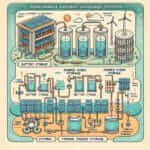The IELTS Reading module often includes passages related to current global issues. One such topic is the “Effects of Climate Change on Agriculture Productivity.” Given the growing importance of understanding environmental impacts, this subject frequently appears in IELTS tests. This passage aims to provide a comprehensive practice text tailored for IELTS candidates to hone their reading skills. The content is derived from real-world contexts, ensuring relevance and educational value.
Why This Topic?
Climate change is a critical issue with widespread effects on various aspects of life, particularly agriculture. As it impacts food security and economic stability, examining how climate change alters agricultural productivity is timely and pertinent.
Reading Passage
Effects of Climate Change on Agriculture Productivity
Climate change has become a significant global challenge, influencing multiple facets of life, including agriculture. The rising temperatures, erratic weather patterns, and changing precipitation levels directly impact the agricultural sector, leading to various consequences on crop yields and food security.
 Impact of Climate Change on Crops
Impact of Climate Change on Crops
Rising Temperatures
One of the most evident effects of climate change is the increase in global temperatures. Higher temperatures accelerate the growing season, reducing the time crops have to mature. This can lead to lower yields and reduced agricultural productivity. For example, studies suggest that for every degree Celsius rise in temperature, the yields of wheat, rice, and maize could drop significantly.
Erratic Weather Patterns
Climate change has also resulted in more frequent and severe weather events. Droughts, floods, and hurricanes disrupt farming systems, destroy crops, and degrade soil health. The unpredictability of these extreme weather conditions makes it challenging for farmers to plan and manage their agricultural activities effectively.
Changes in Precipitation
Precipitation patterns are changing due to climate change, with some regions experiencing more rainfall and others facing severe droughts. Consistent and adequate rainfall is crucial for crop growth. Regions that are increasingly dry may suffer from water scarcity, leading to reduced irrigation and lower crop yields. Conversely, excessive rainfall can cause waterlogging, damaging crops and reducing agricultural productivity.
Soil Degradation
Soil health is critical for successful agriculture. Climate change exacerbates soil degradation through erosion, loss of organic matter, and salinization. Healthy soil acts as a buffer against temperature extremes and retains moisture, supporting crop growth. Degraded soil, however, loses its ability to perform these functions, resulting in poorer crop yields.
Pests and Diseases
Warmer temperatures and changing climates can alter the distribution and life cycles of pests and diseases. Crops may become more susceptible to pest infestations and diseases, as the conditions become more favorable for their proliferation. This requires farmers to use more pesticides and can lead to resistance issues and increased production costs.
Comprehension Questions
Multiple Choice
-
What is one primary impact of rising temperatures on crops?
- A. Longer growing seasons
- B. Accelerated degradation of soil
- C. Reduced time for crops to mature
- D. Increased precipitation
-
Which of the following is NOT mentioned as a result of erratic weather patterns?
- A. Droughts
- B. Floods
- C. Hurricanes
- D. Increased crop health
True/False/Not Given
- True/False/Not Given: Warmer temperatures have no effect on the life cycles of pests and diseases.
- True/False/Not Given: Increased rainfall is beneficial for all types of crops.
Matching Information
-
Match the effects to the corresponding climate change factor:
Climate Change Factor Effect Rising Temperatures A. Water scarcity Erratic Weather Patterns B. Reduced crop maturation period Changes in Precipitation C. Pest infestation proliferation
Answer Key
Multiple Choice
- C. Reduced time for crops to mature – Higher temperatures accelerate the growing season, reducing the time crops have to mature.
- D. Increased crop health – The passage does not mention increased crop health due to erratic weather patterns.
True/False/Not Given
- False – The passage mentions how warmer temperatures can alter the distribution and life cycles of pests and diseases.
- Not Given – The passage discusses both positive and negative effects of rainfall changes but does not make a blanket statement that increased rainfall is beneficial for all crops.
Matching Information
| Climate Change Factor | Effect |
|---|---|
| Rising Temperatures | B. Reduced crop maturation period |
| Erratic Weather Patterns | A. Water scarcity |
| Changes in Precipitation | C. Pest infestation proliferation |
Common Mistakes to Avoid
- Misinterpreting Details: Many candidates misread specific details, leading to incorrect answers. Always read carefully.
- Ignoring Keywords: Pay attention to keywords that signal crucial information regarding cause and effect.
- Skimming and Scanning: Develop techniques to quickly locate information within the text without misreading.
Vocabulary
- Erratic (adj.) /ɪˈrætɪk/: Unpredictable and inconsistent.
- Degradation (n.) /ˌdɛɡrəˈdeɪʃən/: The process of something being damaged or worsened.
- Salinization (n.) /ˌsælɪnaɪˈzeɪʃən/: The accumulation of salts in soil, reducing its fertility.
- Proliferation (n.) /prəˌlɪfəˈreɪʃən/: Rapid increase or spread.
Grammar Focus
- Passive Voice: Often used to focus on the action rather than the subject.
- Example: “Soil health is exacerbated by climate change.”
- Complex Sentences: Effective for detailing cause and effect.
- Example: “As the climate continues to warm, the proliferation of pests will likely increase.”
Advice for IELTS Reading Success
- Practice Regularly: Regular reading practice can significantly improve your comprehension skills.
- Enhance Vocabulary: An expansive vocabulary allows for better understanding and quicker reading.
- Time Management: During the actual test, manage your time wisely to ensure you can read and respond to all questions.
For more related readings, you might find these useful:
- Social Implications of Climate Change on Developing Countries
- The Impact of Climate Change on Economic Stability
- The Effects of Climate Change on Agricultural Yields
By focusing on topics like climate change and practicing regularly, you will enhance your reading abilities and increase your chances of achieving a high band score in the IELTS Reading module.


